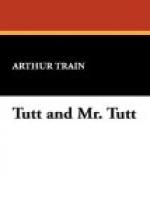Now the judge, being recently elected and unfamiliar with the situation, did not realize that nothing could have been farther from the Oriental mind or intention than an attack upon the officers engaged in the administration of local justice, whom they regarded merely as nuisances. What these Chinamen supremely desired was to be allowed to settle their own affairs in their own historic and traditional way—the way of the revolver, the silken cord, the knife and the iron bar. Once enmeshed in Anglo-Saxon juridical procedure, to be sure, they were not averse to letting it run its course on the bare chance that it might automatically accomplish their revenge. But they distrusted it, being brought up according to a much more effective system—one which when it wanted to punish anybody simply reached out, grabbed him by the pigtail, yanked him to his knees and sliced off his head. This so-called American justice was all talk—words, words, words! From their point of view judges, jurymen and prosecutors were useless pawns in life’s game of chess. Perhaps they are! Who knows!
When Judge Bender entered the court room it was, in spite of his injunction, full of blue blouses. A special panel of two hundred talesmen filled the first half dozen rows of benches, the others being occupied by witnesses both Chinese and white, policemen and the miscellaneous human flotsam and jetsam that always manages somehow or other to find its way to a murder trial. Inside the rail O’Brien, the assistant district attorney, was busy in conversation with three cueless Chinamen in American clothes. At the bar sat Mock Hen with Mr. Tutt beside him, flanked by Wong Get, Tutt, Bonnie Doon and Buddha.
The judge beckoned Mr. Tutt and O’Brien to the front of the bench.
“Is there any chance of disposing of this case by a plea?” he inquired.
O’Brien looked expectantly at Mr. Tutt, who shook his head. The judge shrugged his shoulders.
“Well, how long is it going to take?”
“About six weeks,” answered the old lawyer quietly.
“What!” ejaculated judge and prosecutor in unison.
“A day or two less, perhaps,” affirmed Mr. Tutt, “but, likely as not, considerably longer.”
“I shall cut it down as much as I can,” announced the judge, appalled at the prospect. “I shall not permit this trial to be dragged out indefinitely.”
“Nothing would please me better, Your Honor,” said Mr. Tutt with the shadow of a smile. “Shall we proceed to select the jury?”
The accuracy of Mr. Tutt’s prophecy as to the probable length of the trial was partially demonstrated when it developed that most of the talesmen had a pronounced antipathy to Chinese murder cases, and a deep-rooted prejudice against the race as a whole. In fact, a certain subconscious influence affecting most of them was formulated by the thirty-ninth talesman to be rejected, who, in a moment of resentment, burst forth, “I don’t mind trying decent American criminals, but I hold it isn’t any part of a citizen’s duty to try Chinamen!” and was promptly struck off the jury list.




